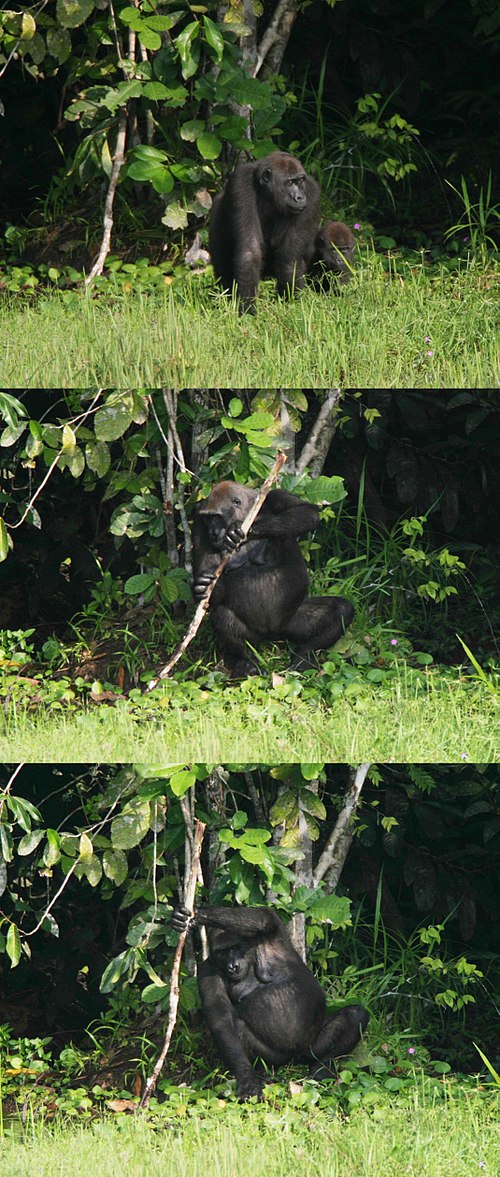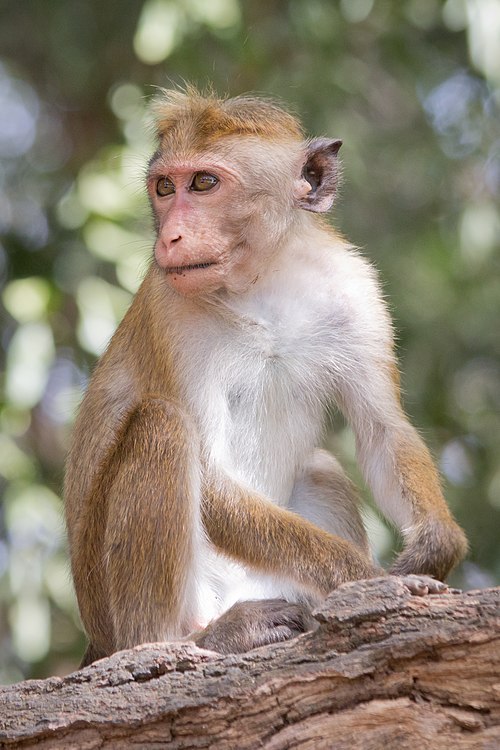Apenoun
A primate of the clade Hominoidea, generally larger than monkeys and distinguished from them by having no tail.
Apenoun
Any such primate other than a human.
Apenoun
(derogatory) An uncivilised person.
Apenoun
One who apes; a foolish imitator.
Apeverb
(intransitive) To behave like an ape.
Apeverb
(transitive) To imitate or mimic, particularly to imitate poorly.
Apeadjective
(slang) Wild; crazy.
Apenoun
A quadrumanous mammal, esp. of the family Simiadæ, having teeth of the same number and form as in man, and possessing neither a tail nor cheek pouches. The name is applied esp. to species of the genus Hylobates, and is sometimes used as a general term for all Quadrumana. The higher forms, the gorilla, chimpanzee, and ourang, are often called anthropoid apes or man apes.
Apenoun
One who imitates servilely (in allusion to the manners of the ape); a mimic.
Apenoun
A dupe.
Apeverb
To mimic, as an ape imitates human actions; to imitate or follow servilely or irrationally.
Apenoun
any of various primates with short tails or no tail at all
Apenoun
someone who copies the words or behavior of another
Apenoun
person who resembles a non-human primate
Apeverb
imitate uncritically and in every aspect;
Apeverb
represent in or produce a caricature of;
Apenoun
a large primate that lacks a tail, including the gorilla, chimpanzees, orangutan, and gibbons.
Apenoun
used in names of macaque monkeys with short tails, e.g. Barbary ape.
Apenoun
(in general use) any monkey.
Apenoun
an unintelligent or clumsy person.
Apenoun
an inferior imitator or mimic
Apeverb
imitate (someone or something), especially in an absurd or unthinking way
Ape
Apes (Hominoidea ) are a branch of Old World tailless simians native to Africa and Southeast Asia. They are the sister group of the Old World monkeys, together forming the catarrhine clade.
Monkeynoun
Any member of the clade Simiiformes not also of the clade Hominoidea containing humans and apes, from which they are usually, but not universally, distinguished by smaller size, a tail, and cheek pouches.
Monkeynoun
(informal) Any nonhuman primate, including apes.
Monkeynoun
(informal) A mischievous child.
Monkeynoun
A dance move popular in the 1960s.
Monkeynoun
Five hundred pounds sterling; five hundred dollars.
Monkeynoun
(slang) A person or the role of the person on the sidecar platform of a motorcycle involved in sidecar racing.
Monkeynoun
(slang) A person with minimal intelligence and/or an unattractive appearance
Monkeynoun
(blackjack) A face card.
Monkeynoun
(slang) A menial employee who does a repetitive job, as in code monkey, grease monkey, phone monkey, powder monkey.
Monkeynoun
The weight or hammer of a pile driver; a heavy mass of iron, which, being raised high, falls on the head of the pile, and drives it into the earth; the falling weight of a drop hammer used in forging.
Monkeynoun
(historical) A small trading vessel of the sixteenth century.
Monkeynoun
(slang) A drug habit; an addiction; a compulsion.
Monkeynoun
A fluid consisting of hydrochloric acid and zinc, used in the process of soldering.
Monkeyverb
To meddle; to mess (with).
Monkeyverb
(transitive) To mimic; to ape.
Monkeynoun
In the most general sense, any one of the Quadrumana, including apes, baboons, and lemurs.
Monkeynoun
A term of disapproval, ridicule, or contempt, as for a mischievous child.
Monkeynoun
The weight or hammer of a pile driver, that is, a very heavy mass of iron, which, being raised on high, falls on the head of the pile, and drives it into the earth; the falling weight of a drop hammer used in forging.
Monkeynoun
A small trading vessel of the sixteenth century.
Monkeyverb
To act or treat as a monkey does; to ape; to act in a grotesque or meddlesome manner.
Monkeynoun
any of various long-tailed primates (excluding the prosimians)
Monkeynoun
one who is playfully mischievous
Monkeyverb
play around with or alter or falsify, usually secretively or dishonestly;
Monkeyverb
do random, unplanned work or activities or spend time idly;
Monkey
Monkey is a common name that may refer to certain groups or species of simian mammals of infraorder Simiiformes. The term is applied descriptively to groups of primates, such as families of New World monkeys and Old World monkeys.























